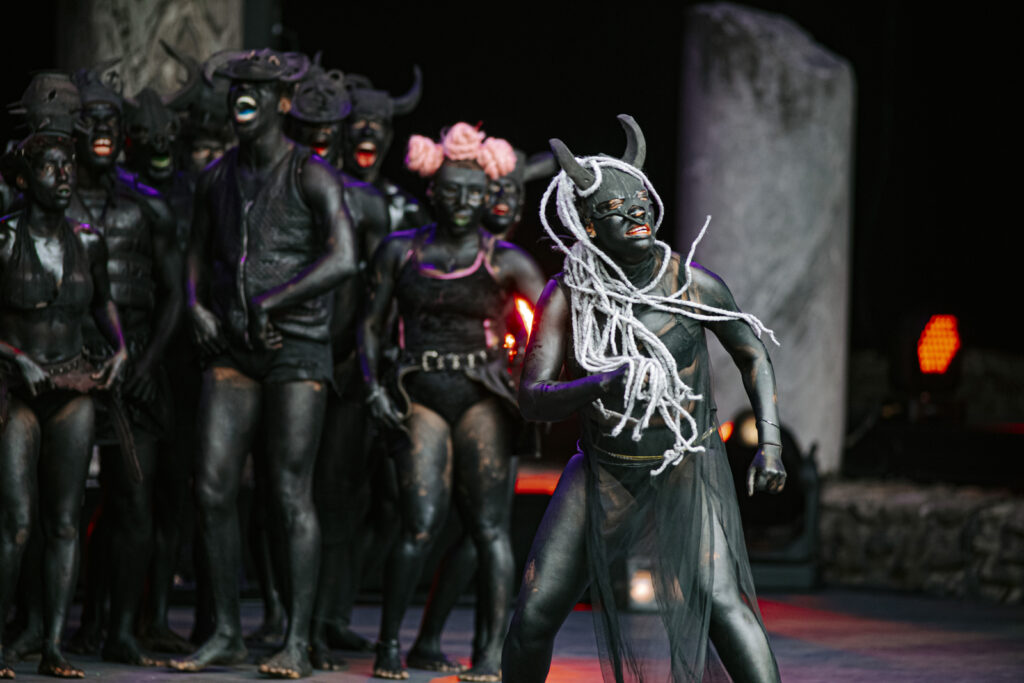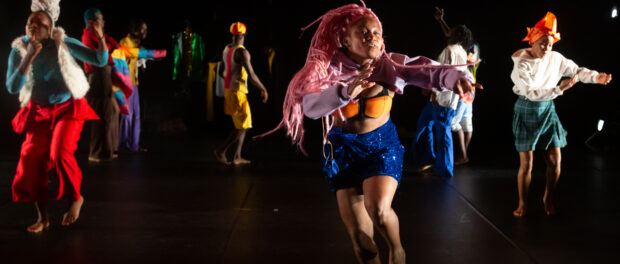Review: Re:Incarnation
It’s something of a coincidence that the day I saw Re:Incarnation, I happened to finish British-Nigerian author Tade Thompson’s Rosewater. Thompson’s science fiction novel takes place in Lagos, the very city that Re:Incarnation’s choreographer and creator, Qudus Onikeku calls home. Both the novel and the dance performance are not shy. They tackle the biggest themes: survival, death, and resilience. Although they represent different genres, different media, somehow both juxtapose the fantastic and the familiar. I can only attribute it to the fact that both Tade and Onekeku are Yoruba, one of the major ethnic groups of Nigeria which has its own language, religious system, and mythology that predates European colonization.
Re:Incarnation is a large production, especially compared to many of the dance works I’ve seen on the Montreal stage in recent years. QDance Company’s 10 dancers and two musicians command the stage with Broadway-like showmanship. This is not remote arte meant to be watched as though seeing a beautiful rare goldfish in a bowl, but rather a spectacle that is aware of its audience and intent on delighting them. The dancers spread their arms and gaze to the audience and it feels from the heart. This loving, shared aspect to performance is further underscored by allowing each member of the cast to retain their charismatic individuality while still working as a company. It is it easy to connect to each of them, although perhaps the most eye catching is the woman whose long pink box braids sweep the floor.
The throughline of the story is a little harder to follow, but overall it seems to be about a cyclical transition between life and death and back again. And as the show starts, the dancers begin to replicate the movements of daily human life in a robotic fashion. They work, meet, and fornicate with stiff, staccato movements. They rotate through encounters with one another, but the overall message seems to be about how we are mere puppets or automata, and our existence is not really life at all. But, then, as if someone shouted TGIF, the dancers shed this first identity and change into colorful clothing on stage. They break-out into an energetic revelry that melds traditional movements with contemporary styles of afrofunk, breakdance, and hip hop.
The celebration ends as a man is attacked and left twitching in his death throes as the piece shifts to another supernatural world, away from human. The dancers become animals or perhaps hybrid creatures, as well as spirits. A series of vignettes features solo dancers as predator or prey. It is unclear if this is one soul’s reincarnations or an exploration of a theme through different individuals. Some fight back, some give in. While the dancers are masterful at capturing the animal-like movements, whether it is the twitchy grandeur of birds, the curious aggression of a troop of primates, or even the deliberate energy conservation of pond creatures, the segment does seem to get lost in itself. Though, there are riveting moments. I was especially struck when an elderly, presumably human couple is claimed by the spirits. The agony of the loss of a partner and the resistance to death are moving, especially when contrasted with the otherworld-ly, relentless spirits that surround them with long sticks. The spirits invoke awe in the sense they are both impressive and terrifying.

The last part of the production is redemptive and it is here most of all that I thought of how Thompson’s book and Onikeku share a common theme — what is the essence of being an African. For both, there is a stripping away of artifices to get at the core of one’s essence. For Onikeku, this purification happens through being burnt. Words are projected on a screen behind the dancers informing us that fire purifies and to reincarnate, one must get back to black. Is it a political statement about removing colonialism or finding joy in one’s origins. Regardless of what other meanings can be inferred, Onikeku also means it literally, in the sense of a purifying fire that burns all things to charcoal. This is conveyed by having one dancer speak a series Nigerian sayings (in English) as the others smear her with an oily black paint. She is soon covered — burning, as it were, bit by bit. The entire company is also found to be painted in black as well as they sport horns and masks. Are they now all spirits? The ecstatic dance that follows is riveting.
Re: Incarnation is a tremendous piece, despite its slightly puffed-up middle. The exuberance, energy, and athleticism of the company, combined with their ambassadorial good will and genuine openness comes through. There’s much to enjoy in this show and also things to think about. Nigeria never came up on my radar often — I blame my own ignorance — as its cultural output is of high calibre and profound in its reach. Re: Incarnation is a perfect piece to start the Festival TransAmérique for 2022, where the best of performance from around the globe comes to Montreal for a few weeks.
Re: Incarnation is part of Festival TransAmériques at Théâtre Jean-Duceppe (Place-des-arts) from May 25 to 28, 2022. FTA runs from May 25 to June 9.






